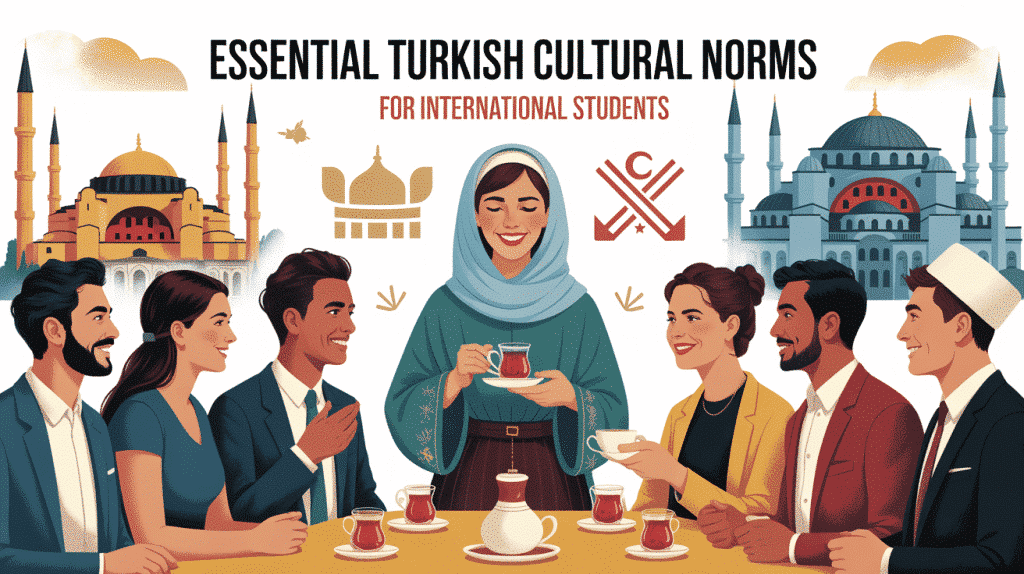Important Turkish Cultural Norms Every Student Should Know
Hospitality: The Heart of Turkish Culture
One of the most cherished qualities of Turkish culture is hospitality, known as misafirperverlik. Turkish society places immense value on making guests feel welcome, which can be particularly beneficial for international students.
- Warm Welcomes: Students can anticipate being graciously welcomed by locals, even as unexpected guests. In Turkish culture, such individuals are often regarded as “guests from God” (Tanrı Misafiri) – a phrase highlighting the deep respect accorded to visitors.
- Visiting Homes: When visiting someone’s home, it is customary to remove your shoes at the door. Hosts typically provide slippers, signifying comfort and cleanliness.
- Offering Refreshments: It is common practice for hosts to offer tea or coffee, served in tulip-shaped glassware, a gesture aimed at expressing hospitality and respect.
Dining Etiquette
Dining in Turkiye is not merely a way to satiate hunger; it’s a social event centered around shared enjoyment and community.
- Meal Acceptance: International students may find it impolite to refuse food or decline additional servings. It’s best to accept offers graciously or decline very politely.
- The Sacredness of Bread: Bread holds a revered status in Turkish culture. Wasting bread is viewed negatively, and leftover bread is often reused or given away as a sign of respect.
- Recognizing the Cook: After enjoying a meal, expressing thanks to the cook by saying “Elinize sağlık” (Health to your hands) is customary, acknowledging their effort and care.
Public Behavior and Etiquette
Understanding appropriate public behavior can help students blend in seamlessly with their surroundings.
- Public Affection: Public displays of affection are commonly avoided, especially in traditional and religious spaces. International students should be cognizant of local customs in this regard.
- Mindful Behavior: Following the cues of Turkish peers in social scenarios is advisable. Whether in public spaces or formal events, this mindfulness fosters goodwill and understanding.
Language Use and Communication
While many Turks living in urban areas are proficient in English, striving to learn some basic Turkish can significantly enrich the experience.
- Basic Phrases: Learning key Turkish phrases not only demonstrates respect but also aids in daily interactions. Simple greetings or polite expressions can help international students navigate various situations more smoothly.
- Politeness is Key: Making genuine attempts to engage in Turkish is usually met with warmth and appreciation, thereby promoting cultural exchange and mutual respect.
Cultural Participation
Engaging with the local culture is one of the most enlightening aspects of studying abroad.
- Traditional Activities: Participating in cultural events, such as visiting a traditional Turkish bath (hammam) or attending local festivals, offers insights into the customs and traditions unique to Turkiye.
- Broaden Your Horizons: Exploring regions beyond the university city can enhance cultural appreciation, as each area of Turkiye presents its distinct heritage and lifestyle.
Relationship Building
Building relationships is a cornerstone of a fulfilling study experience.
- Cross-Cultural Friendships: Establishing friendships with both Turkish and international students enriches the academic journey. Shared experiences and insights can create a supportive network that eases the transition into a new culture.
- Networking Opportunities: Through social interactions, students can develop professional connections that may benefit their careers in the future.
Conclusion
International students who actively engage with and embrace these Turkish cultural norms will find themselves not only welcomed but respected within Turkish society. Each interaction offers an opportunity for growth and enrichment during their academic journey.
If you are considering studying in Turkiye, Study in Turkiye provides comprehensive resources and guidance to navigate the educational landscape, connect with top universities like Antalya Bilim University, Medipol University, and Aydin University, and understand the intricacies of cultural adaptation.
Take the Next Step with Study in Turkiye
Explore further to turn your dream of studying in Turkiye into a reality!


Social Norms and Greetings
In navigating social interactions, being aware of Turkish norms and greetings is essential.